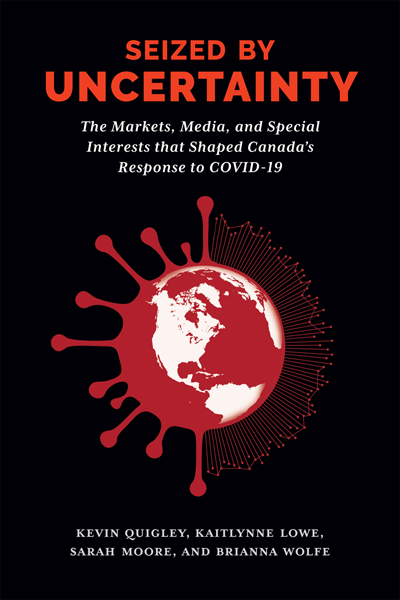Book: Seized by Uncertainty
New from McGill-Queens University Press
Seized by Uncertainty: The Markets, Media, and Special Interests That Shaped Canada’s Response to COVID-19 examines how Canadian governments at various levels responded to the pandemic.
Co-authored by MacEachen Institute Scholarly Director Kevin Quigley and Institute research assistants Kaitlynne Lowe, Sarah Moore and Brianna Wolfe, the book is the result of research conducted in real time, beginning in March of 2020 as COVID-19 shut down public life in Canada and abroad.
Much of this research is also captured in briefing notes published by the MacEachen Institute throughout the pandemic.

What does Seized by Uncertainty contribute to our understanding of the pandemic?
What lessons should we learn from the pandemic?
Science vs. Ethics
Book Description:
The COVID-19 virus was responsible for the deaths of over thirty-five thousand Canadians in its first two years alone. Described as the biggest public health crisis of the century, it was an uncertain threat, which emerged within complex psychological, social, legal, administrative, and economic contexts.
Seized by Uncertainty explains how Canadian governments responded to that threat. Despite early warning signs, governments failed to appreciate the trade-offs required to respond to the pandemic. Their approach, at times intolerant of debate and ignorant of diversity, served the interests of some over others. Their response prioritized stability and containment, enabling four in ten people to work from home, disproportionately benefiting an educated middle class who profited further from soaring stock markets and housing prices. Mental health issues spiked, racialized people were much more likely to test positive for the virus, those in low-income sectors experienced unstable employment and lacked workplace safety protections, the lives of low-risk youth were in constant suspension, and residents of some care homes were virtually abandoned.
Seized by Uncertainty studies the pandemic response through the contexts in which it emerged, exposing uncomfortable truths about a fragmented society and governance problems that predated the threat.
